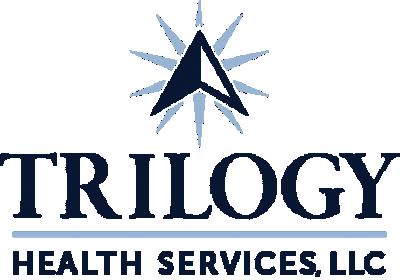
20 minute read
asket full of care• A b
A BASKETFUL OF CARE
11 PLACES YOU SHOULD KNOW ABOUT IF YOU ARE A CAREGIVER OR ARE LOOKING FOR HELP
By Tiffany White
Whether you’re a caregiver searching for support or who needs extra help, use this list as your guide for making life easier.
CHILL OUT
Glenda Hodges Cook, an instructor at Passionist Earth & Spirit Center, is showing people how to face aging with acceptance instead of fear. Her Unpacking the Gift of Aging Meditation class is divided into two 4-week sessions. Part one is a group discussion about the myths of aging while the second part uses mindfulness meditation as a method for embracing the aging process and understanding how to live in the moment. “The point is to let go into aging rather than resisting it,” she says. Glenda says most people feel uncomfortable talking about aging and death, but this class gives her participants an opportunity to address these topics in a constructive and healthy way. The class, which began last October, has been postponed because of COVID-19, but the center plans to resume the class in January 2021 and will be partnering with the University of Louisville Trager Institute and the Republic Bank Foundation Optimal Aging Clinic.
AGING SIMPLIFIED
The Thrive Center is introducing the community to innovative technology and solutions that promote healthy aging. Sheri Rose, CEO and executive director, says the center's objective is to give older adults the empowerment and independence they seek as they age. The center features multiple technologies that are changing the scope of aging, such as an assistive eating device. With the press of a button, it maneuvers food around the plate and lifts it to your mouth. The Audio Cardio is designed to improve hearing, and their Samsung Smart Home features an induction cooktop, which prevents people from getting burned. The center also has partnered with Bellarmine University to develop Strive to Thrive. “One of the biggest issues is mobility. In this program, we show people how to fall to avoid a fracture and how to get up if they fall,” she says.
FILLING IN THE GAPS
The Kentucky Area Agency on Aging wants caregivers and their loved ones to know help is not out of reach. KIPDA is responsible for the planning, development, and implementation of programs for older adults, which include meal delivery, transportation, in-home care services, and caregiver support services. KIPDA serves Jefferson, Oldham, Henry, Trimble, Shelby, Bullitt, and Spencer counties. Jessica Elkins, director of the division of special services at KIPDA, says the organization also provides case management and referral services for caregivers. When needed, the organization will refer caregivers to a support group or provide vouchers that allow them to purchase incontinence supplies for their loved one and medical assistive technology at a discounted price. Providing the right type of resources for families, says Jessica, has become more important in light of the pandemic. “We are looking for ways to partner with other organizations, and we are working to establish relationships with care coordinators and transitional services.” She adds, “We work with local hospitals and health plans to ensure that we are there from step one. When you are taking your loved one home, we want to make sure you are aware of the services that are available in this COVID-19 environment.”
EAT FOR CHEAP
The Jewish Community Center’s senior adult program offers a congregant lunch program, Jewish-based cultural programs, fitness classes, and entertainment for older adults throughout the year. Although most of these services are on hold because of COVID-19, their staff continues to provide meals for a donation of $3 to anyone 60+ regardless of whether they are homebound. As a designated Meals on Wheels site, they can deliver meals weekly and have served over 6,000 clients since the pandemic began. Members also have the option of participating in virtual fitness classes on Facebook Live.
HEALTHCARE WITH A PERSONAL TOUCH
Using a holistic approach is how Dr. Anna Faul, executive director of the University of Louisville Trager Institute and the Republic Bank Foundation Optimal Aging Clinic, ensures that older adults receive the best care possible. “We asked ourselves, ‘how can we make this a good experience — an experience of value?’” she says. Dr. Faul says her staff examines all of the factors that can influence a patient’s health and well-being. “Your doctor could tell you that you need to lose weight and exercise, but you might not know how to do it if you don’t have access to healthy food or transportation,” she says. The clinic pairs patients with navigators who identify their barriers and connect them with pertinent resources. The clinic, which opened in September 2019, has a laid-back environment featuring a demonstration kitchen, fitness classes, meditation classes, behavioral health services, and caregiver support. Their team meets weekly to discuss patient cases and develop care plans. Currently, they are developing mini-virtual clinics that will be located in senior centers within the rural areas of Kentucky and in West Louisville. People who use one of these virtual clinics can check their own blood pressure and blood glucose levels. Dr. Faul’s team receives the results remotely and can arrange a telehealth visit with the patient. “You are one person, but you have so many parts that play a role in your health and well-being, and we want to be there for you in that journey,” she says.
STAY SAFE
Empowering older adults to live independently and with dignity is the cornerstone of ElderServe. Drew Hight, director of development and marketing, says the organization has developed programming based on four pillars: supporting independence, overcoming social isolation, protecting seniors from crime, and promoting wellness. Through their care management program, on-staff social workers help clients find food, housing, and other resources to achieve stability. Caregivers who are in need of respite will be able to use their ElderServe Adult Day Health Center when it reopens in 2021. The center serves medically fragile people who aren’t ready for a nursing home or assisted living community. Their friendly-visitor program — now done virtually through Zoom or by phone — matches volunteers with an older adult based on proximity and common interests. Or clients can receive phone calls from a volunteer three days a week as part of their Telecare program. The senior companion program matches older adults with volunteers who are their peers and can assist them with housekeeping or other tasks. The organization is also committed to advocating for victims of scams, abuse, robbery, and neglect. “We can help them navigate the court process, file an EPO, and work with the Louisville Metro Police Department,” Drew says. For active older adults, ElderServe offers fitness classes, quilting classes, bingo, and provides meals for clients based on their income.
CONVENIENCE YOU CAN COUNT ON
Highland Community Ministries is filling the void for people who don’t have basic essentials. Their individual family and assistance program helps clients of all ages with paying their LG&E bill, water bill, rent payment, and certain medications. The income-based program is available to applicants who have a 40204, 40205, or 40218 zip code. HCM, which works with Meals on Wheels to deliver food to clients, makes it easier to maintain a healthy lifestyle despite the pandemic. In-person fitness classes at the Highlands Community Campus have been canceled, but members can request to receive exercise videos through email. HCM staff are also using telephone reassurance as a way of keeping clients socially engaged. Volunteers call clients weekly to check on them and give them tips on how to cook nutritious meals and stay safe at home.
PLAY FOR A WHILE
If you’re looking for an escape from the mundane, a Jeffersontown Senior Center membership might add some excitement to your days. Typically, the center offers congregant meals, fitness classes, leisure activities, and overnight trips, but in adherence to social distancing guidelines, the staff has developed a new activity schedule. The center is now open daily for breakfast from 8-10:30am, and members can participate in a workout session where they are able to view an exercise video at the center. The staff sanitizes in between events to ensure the safety of their members. “We encourage social distancing and wearing masks. For activities such as Bingo, members bring their own dauber. We want them to have something to look forward to,” says Julie Guerin, center director.
THE MEMORY SAVER
An Alzheimer’s diagnosis is life-changing, but the University of Kentucky Sanders-Brown Center on Aging provides opportunities for those who are either at high risk for developing Alzheimer’s or are experiencing symptoms of dementia. They give patients the option of trying many of the leading experimental therapies in the world. “We’re here to understand aging and the potential for cognitive change, which robs older adults of their functional abilities,” says Dr. Gregory Jicha, professor of neurology at the University of Kentucky and director of the center. The center’s research program, Dr. Jicha says, also recruits people for annual memory and thinking testing — the majority of which are cognitively normal but may have a family history of Alzheimer’s or some other form of dementia. “While they are contributing to their own understanding, we’re also serving as a vital watchdog for them and assisting them should we see early signs of decline,” he says.
KEEPING YOU INDEPENDENT
Improving the quality of life for caregivers and their loved ones is one of the main objectives of Senior Care Experts. “We help seniors and adults stay at home to remain safe and independent, which allows them to maintain their self-respect and dignity,” says Patty Dissell, executive director. While the organization serves older adults, their client base includes people who are disabled or have other debilitating diseases such as Parkinson’s. “We take a holistic approach, because we are very person-centered. When someone needs any kind of assistance, we are going to learn about the individual and recommend various services and programs for them,” she says. Their social workers work with clients and their families to examine all areas of the client’s life to develop a better living situation for them. “This includes their support system, psychosocial [issues], and finances. We determine what other resources they need and how we can help them get those resources,” she says. Their programs include home-delivered meals, which also serve as wellness checks, medical alert devices with GPS tracking, and programmable medication dispensers.
EMPOWERING CARE PROVIDERS
The Kentucky Senior Living Association is doing its part to ensure that residents in long-term care communities are receiving optimal care. “It is the only association in the state that represents assisted living, personal care, memory care, and independent living communities,” says Bob White, executive director. Long-term care communities that join the association participate in conferences and workshops. “We do a lot of staff development and staff training, because they are the key to our operations. On the clinical side, we go over a lot of training regarding executive directors who are in charge of those communities by teaching best practices and frequently asked questions,” he says. The association is also politically active in efforts to lobby bills that might affect the industry, and they encourage members to do the same.
CAREGIVER GUIDE
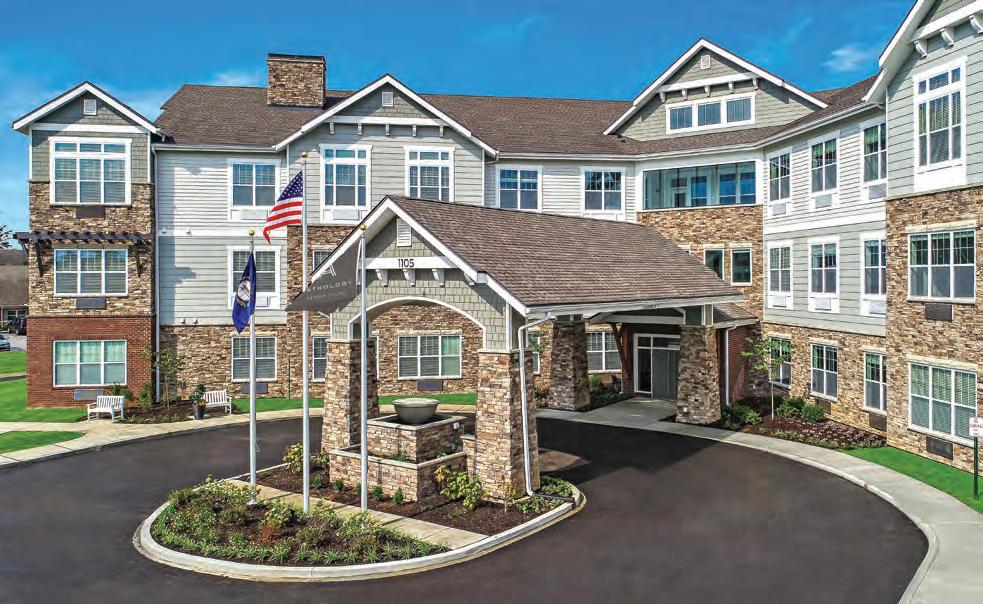
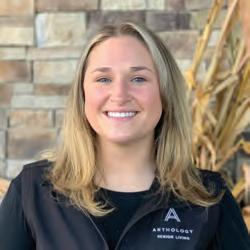
By Carrie Vittitoe | Promotion
ANTHOLOGY OF LOUISVILLE |
All throughout our lives it is important to be known by other people and not just known by name. To be truly known, we need to be recognized for our talents, our senses of humor, our likes and dislikes. Anthology of Louisville strives to truly know their residents so that staff can recognize and care for their needs as well as deepen relationships.
Anthology is in the process of adopting an art program that is a means of socializing, learning about the person sitting next to you, and building selfconfidence. Residents will soon be able to participate in Opening Minds Through Art (OMA), which was created at the Scripps Gerontology Center at Miami University in Ohio.
Anastasia Noffsinger, executive director at Anthology of Louisville, says the art program is unique because not only does it have residents actually creating art, but “they are relying on imagination rather than memory. It focuses on the skills they have instead of the skills they’ve lost.” She says that art opens up conversations among residents as to their interests and abilities that staff or other residents might not be aware of. An individual who is experiencing cognitive decline but has an aptitude in art may find themselves in a teaching role, which provides them with a renewed sense of purpose and gives a boost to their self-esteem.
Anthology of Louisville is committed to listening to the experts it hires, particularly those individuals who work in the community with residents on a day-to-day basis. These men and women know the residents, their needs, and what programs will best suit them. Learning about residents is also key to how Anthology is preparing to celebrate the holidays, which will certainly look different due to COVID-19. “We’re asking families to share their holiday traditions with us and allow us to incorporate those in the community,” she says. Not only will these traditions benefit the individual resident whose family does the tradition, but it will benefit everyone in the community as a whole because they will learn about their peers and then share their own traditions.

CAREGIVER GUIDE
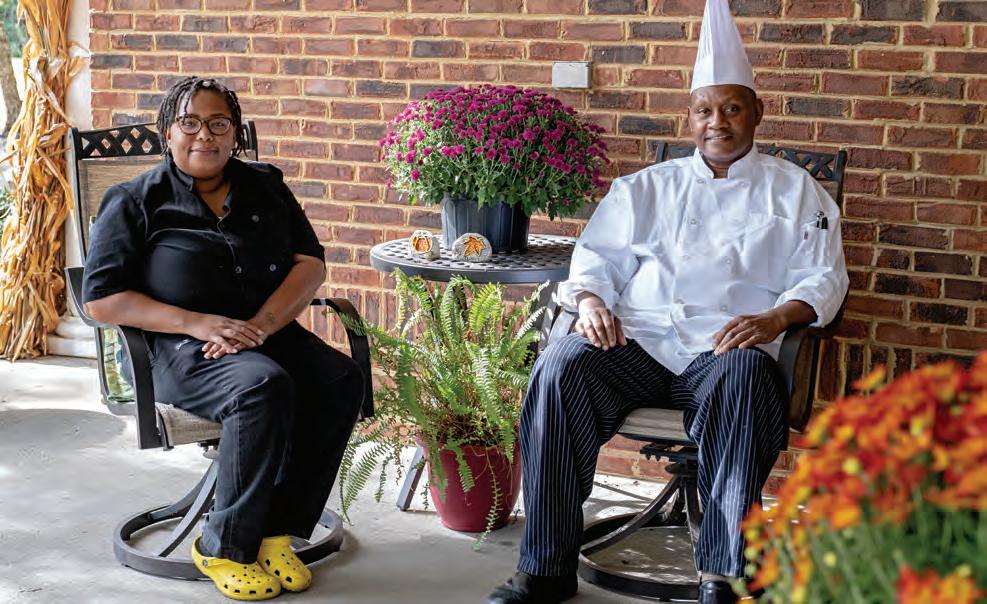
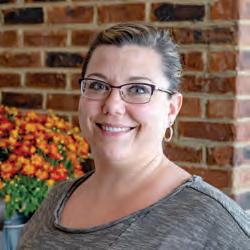
— Amy Clark, Executive Director, Barton House
Pictured from the Barton House dietary team are Chef George Maye (right) and Altease Williams.
By Carrie Vittitoe | Promotion
BARTON HOUSE | Most people realize that nutrition can impact not only a person’s physical health but their mental and emotional health as well. Being dehydrated or having low blood sugar can make an individual feel sluggish and in a fog. For individuals with dementia, it is especially important to make nutrition a priority. At Barton House, staff put a special emphasis on nutrition and diet to ensure seniors in their care have the fuel they need to feel good and stay healthy.
Water or caffeine-free alternatives such as fruit juice are an essential part of the day for Barton House residents. Staff regularly encourage hydration and even put small drops of food coloring into water glasses as a reminder to residents that it is there. “Often a resident with dementia will not drink water because they cannot see it, especially if it is served in a clear glass,” says Executive Director Amy Clark. Hydration acts as a form of occupational therapy for residents as well. They frequently pour and serve drinks to each other with staff on standby for assistance. The act of serving is practical for retaining skills and it gives seniors a purpose of caring for their friends at Barton House.
Meals are scheduled throughout the day to ensure residents’ blood sugar remains stable, and the food is “designer” in nature. “Our food is designed to appeal to our residents, be eaten easily, and be easily digested and absorbed,” Amy says. The meals are high in calories and fiber. Meals are very intentionally less about single servings of separate protein, vegetable, grain, and dairy and more about food combinations. For example, their “Chicken Almost Devine” meal combines chicken, rice, broccoli, milk-based sauce, and cheese. A resident who eats half a serving of this dish receives more nutrients than if they nibbled from single servings of chicken and broccoli and a few sips of milk.
While a focus on nutrition is important, Barton House staff realize that meals should be simplified so that seniors can relax and be as independent as their dementia will allow. Tables are uncluttered and meals are unhurried. Staff eat with residents to promote socialization and camaraderie, but they hope that once COVID-19 abates, families can once again rejoin their beloved seniors for breakfast, lunch, or dinner.
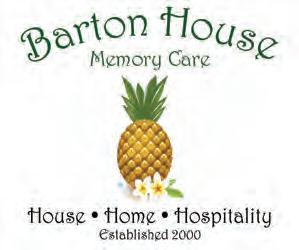
CAREGIVER GUIDE
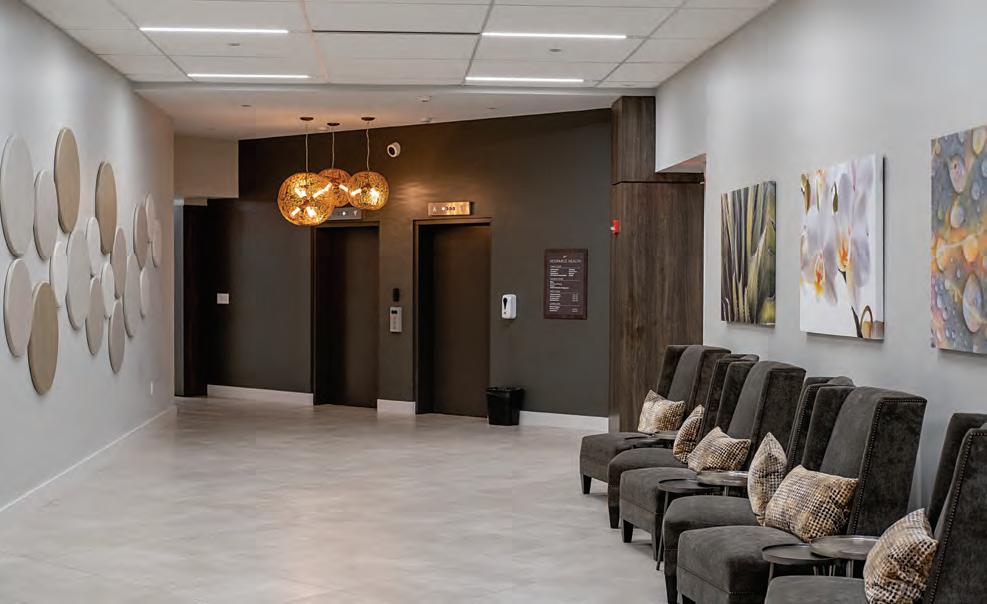
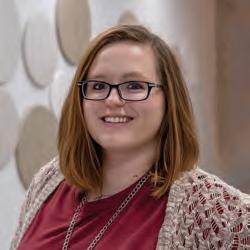
WE CAN HELP THE CAREGIVER FOCUS MORE ON BEING THERE WITH THEIR FAMILY MEMBER INSTEAD OF WORRYING ABOUT OTHER THINGS. WE’RE THAT EXTRA SUPPORT FOR THEM TO TAKE THAT STRESS OFF.”
— Toni Chaudoin, Clinical Supervisor, Hosparus Health By Carrie Vittitoe | Promotion
HOSPARUS HEALTH | Long recognized as a vital source of comfort and support for families whose loved one has received a terminal diagnosis, Hosparus Health also offers palliative care to help individuals with long-term conditions. Regardless of the type of care, Hosparus Health uses a team approach, which not only provides access to doctors and nurses but also to CNAs, chaplains, volunteers, grief counselors, and social workers to help patients and their families manage the stress of illness. Part of that care is helping families create more moments and lasting memories.
Clinical Supervisor Toni Chaudoin says the loved ones of terminally ill patients spend a considerable amount of time worrying about all of their caregiving Health’s support, families can spend time together reminiscing, reading a book aloud, or just sitting in each other’s presence for a while. Not every moment is consumed with the weight of providing end-of-life care.
Navigating a terminal illness comes with all sorts of unknowns and questions, and Hosparus Health staff are equipped to address concerns or get families pointed in the right direction. “We can help get funeral arrangements set up; we can help get health care documents. Maybe the patient is worrying about what’s going to happen after they pass, what’s going to happen with their house, cars, and their belongings,” Toni says.
One big way Hosparus Health helps alleviate stress for families is by being available responsibilities. She says with Hosparus
24/7/365. “We have a new app we just rolled out called TapCloud. It allows patients and family caregivers to send non-urgent messages to their care team,” she says.
Hosparus Health helps patients with making the most of the time they have with their family. “We have helped patients make trips, whether it is to the beach with their family or across the country to see family,” Toni says. Ensuring families have adequate supplies and medications is also important, as is an out-of-state travel contract with another hospice in the area where the patient is traveling.

When a patient enters Hosparus Health’s care, their care team often can eliminate medications that are no longer effective or have side effects that make spending time and cherishing moments difficult. “That can improve their mood, comfort, or energy and allow them to be alert as much as possible, as much as their disease will allow,” Toni says.
CAREGIVER GUIDE
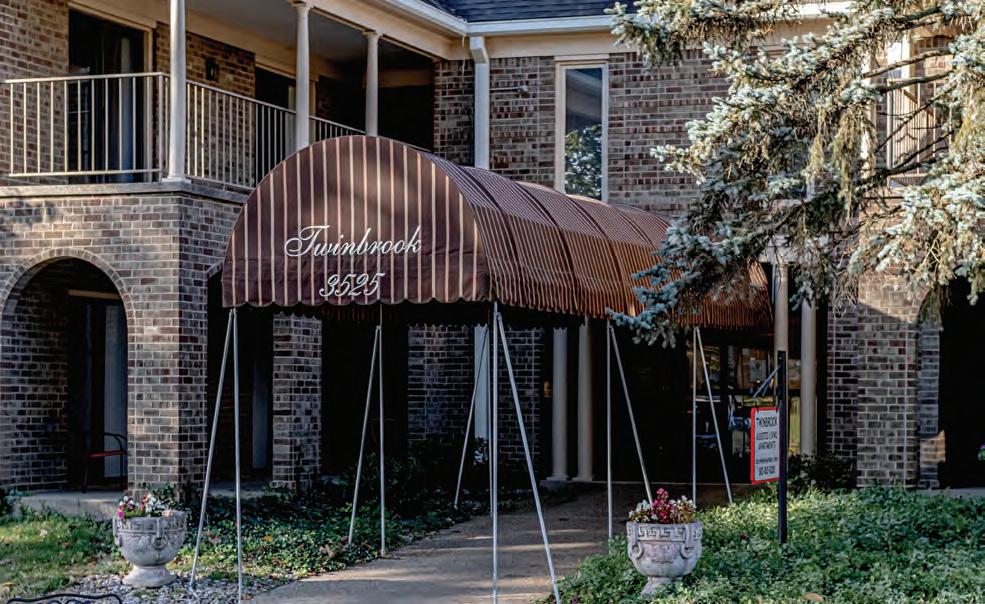
NONE OF OUR RESIDENTS HAVE GOTTEN COVID-19, AND WE’RE KEEPING [OUR EFFORTS] UP NOW THAT RATES ARE INCREASING.”
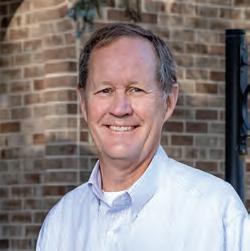
— Brad McCoy, Owner, Twinbrook Assisted Living
By Carrie Vittitoe | Promotion
TWINBROOK | As Aesop’s fable notes, “Slow and steady wins the race,” and that is the approach Twinbrook has taken for ensuring the health and safety of its clients. Families have been appreciative of the efforts Twinbrook staff has taken to ensure clients remain COVID-19-free. “They say, ‘Thank you so much for taking it so seriously and being so attentive,” says Client Services Coordinator Adrienne Madden.
Twinbrook employees are tested at least twice a month for the virus, and no resident has become infected — a trend that families, residents, and staff want to see continue. Twinbrook worked with Walgreens to have a pharmacist provide flu shots so that clients don’t have to visit their own physicians, thereby limiting their potential exposure. Adrienne says she has increased her personal shopping for residents to pick up any needed items for them at nearby grocery stores. Twinbrook staff has taken over the responsibility of ensuring residents get to any essential physician visits.
As Twinbrook has worked to bring small groups of residents back together, it has taken gradual steps. When they reestablished some group games, they waited a month before attempting anything new to ensure procedures were established, everyone followed the guidelines, and no one became ill. They are now working with the Ursuline community to reestablish mass in a safe manner.
Owner Brad McCoy says Twinbrook recently purchased a new call system with alert pendants for residents. Prior to COVID-19, residents were rarely in their apartments, so staff had their eyes on everyone virtually all the time. With residents spending more time in their apartments, it was prudent for staff to be able to respond even more quickly should a need arise.
Residents have risen to the challenge of making changes in their lives in a way that some might find unexpected. Some of the Ursuline Sisters who reside at Twinbrook participated in a Zoom meeting with others in their order to hold elections. Residents have adapted well to wearing masks when they are outside their apartments. “People think older folks are rigid and inflexible, but they’re doing very well,” Adrienne says.

CAREGIVER GUIDE
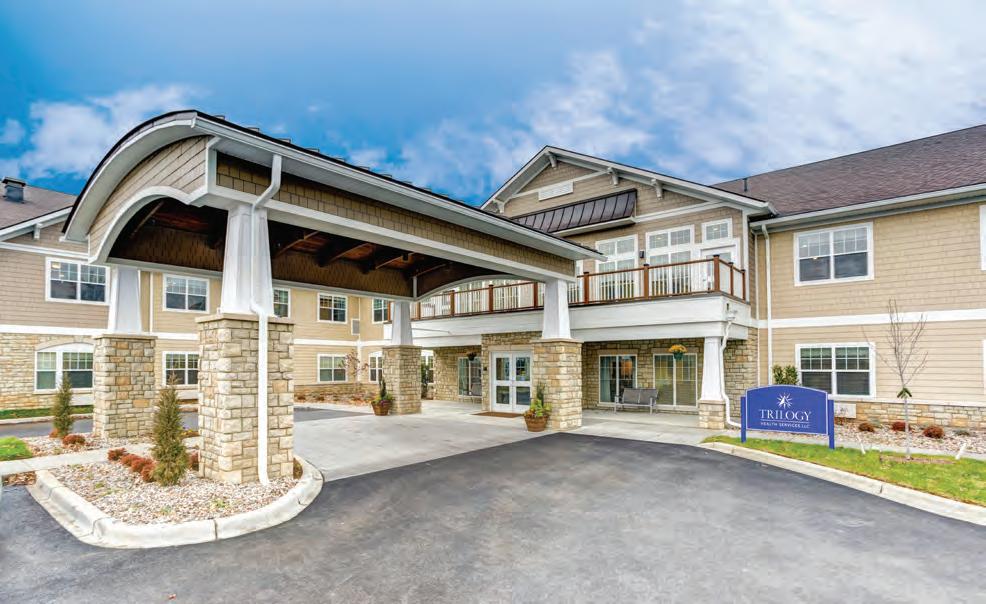
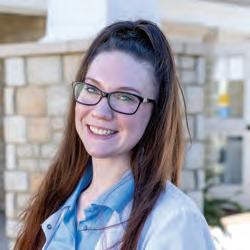
TRILOGY SENIOR LIVING COMMUNITIES HAVE DESIGNATED DIFFERENT ZONES THAT ALLOW US TO PROVIDE QUALITY CARE WHILE UPHOLDING GUIDANCE AS IT PERTAINS TO QUARANTINE MEASURES.”
— Brittany Hanson, Director of Communications, Trilogy Health Services, LLC
By Carrie Vittitoe | Promotion
TRILOGY HEALTH SERVICES |
Trilogy Health Services’ two-pronged mission since March 2020 has been to protect residents from the virus and find meaningful ways to show compassion and care in the midst of mask-adoption and physical distancing. As a result, the team at Trilogy puts the health and wellbeing of their residents and families first, while also ensuring that their emotional needs continue to be met during a time of change and stress.
Just as the virus is invisible, much of what Trilogy does to keep residents safe is invisible to most people. The company created the The Trilogy SHIELD Program in conjunction with the 3M Commercial Solutions division to acquire and use hospital-grade disinfectants at its senior communities. “We are piloting the use of 3M’s CleanTrace™ technology, cold plasma air purification, and in-room UV-C sanitization,” commented Brittany Hanson, Director of Communications at Trilogy. Trilogy was one of the first senior living providers to publish its campus’ COVID-19 statistics publicly, and it sends daily text notifications to families regarding the COVID-19 status of their respective campus. In a year when everything feels uncertain, having up-to-date information sets families at ease.
While all of these efforts have been critical to mitigating the physical impacts of COVID-19, Trilogy knows that consistent and reliable care for residents is essential. Residents develop relationships with staff that deepen over time. These relationships are strengthened by Trilogy’s education assistance program, which helps dedicated employees obtain more training so that they can grow with the company and continue to provide companionship to residents. Delaney McCarley is one such employee.
Beginning as a dietary aide, Delaney has been a part of the Trilogy family for two years. Since joining the team, she has utilized Trilogy’s education assistance program to obtain her Certified Nursing Assistant (CNA) credentials, and is now on her way to becoming a Certified Medication Technician (CMT). “While life in long-term care continues to change, Trilogy continues to be the best in the business — both for its residents and its employees. Whether they’re getting the care they need or getting their hair and nails done, our residents are still being treated to the best that life has to offer, all while employees like me continue to have opportunities for growth and development.”
For a full list of Trilogy locations in Louisville, please visit trilogyhs.com.
